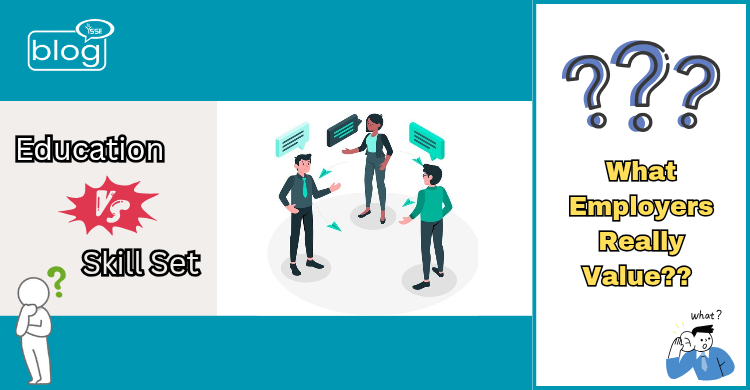Still, there is a debate between education vs skill set and what employers value. The truth is that Employers generally do not view education and skills as separate or opposed to each other. They seek a middle ground based on the specific job and industry rather than favoring one over the other. Education and skills are troublesome factors in evaluating success in any field. Also, the modern job market is increasing rapidly, led by technological advancements, shifting industry demands, and changing behaviors toward qualifications.
While searching for a job, most employers seek a combination of educational qualifications and work experience that matches up to the requirements of the job at hand. It is essential to understand all the things that employers think and value differently, thus allowing job seekers to map and navigate their careers more effectively and wisely. Here is an article outlining what makes education different from experience in the workplace, its significance during a job search, ways to include them in a resume, and superiority in favor of one over the other by employers.
Let’s explore how education and skills impact employer’s choices and career advancement.
Importance of Knowledge :
Education serves as the foundation of knowledge and professional development. It is often regarded as a testament to a candidate’s ability to learn, commit, and achieve. Here are the key benefits of education in the job market:
1. Demonstrates skill:
A degree or certification is commonly seen as evidence that a person possesses a specific level of theoretical knowledge within their area of expertise. This is considered a minimum requirement for a lot of employers.
2. Extensive range of knowledge:
Education is the main root of success. Education also introduces individuals to various subjects, helping develop critical thinking, communication, and problem-solving abilities essential in all careers.
3. Connection Build-up:
Educational backgrounds like schools, colleges, and universities provide chances for students to interact with fellow friends, teachers, and experts in the job field, potentially resulting in internships, mentorships, and employment opportunities.
4. Gateway to Certain Professions:
For careers in fields like medicine, law, or engineering, a formal education is non-negotiable. These careers necessitate extensive academic preparation and certification to guarantee proficiency.
The Power of Skill Sets:
While education provides a strong theoretical foundation, skillsets are the practical abilities that enable individuals to perform tasks effectively. Employers are increasingly focusing on skills that align with job-specific requirements.
1. Instant Benefit:
Candidates who have demonstrated skills can start working immediately, needing less training and helping the organization reach its goals faster.
2. Adaptability to new things:
Changing the work environment rapidly, the skill of adapting to new technologies, tools, and procedures is greatly valued. Adaptability, creativity, and digital knowledge are frequently more important than educational certificates.
3. Problem-Solving Matters :
Practical skills show how well a candidate can handle real-life problems. For example, employers often favor coding boot camp graduates with project portfolios, compared to computer science graduates who lack practical experience.
4. Soft Skills improve :
Soft skills often determine how well an employee fits into a company’s situation and collaborates with others.
What do employers value more – education or skill set?
Employers may occasionally favor candidates who have gained more experience. In some instances, they might opt for candidates who have higher levels of education. It varies depending on the particular position and the qualifications sought by the employer in a potential candidate. Take, for example, if you are applying for a job that demands numerous technical abilities; the employer might favor candidates who have a greater amount of experience. Likewise, when seeking employment, a certain qualification is needed, and the employer might favor candidates possessing suitable schooling.
For job seekers, the key is to strike a balance between education and skill development. Here’s how you can maximize your potential:
1. Improve in Education Strategically:
If obtaining a degree or certification is crucial for your career goals, then go for it. Think about schools or courses that focus on hands-on learning and real-world industry relationships.
2. Develop In- current Skills:
Keep yourself informed about current industry trends and concentrate on gaining skills that are in high demand. Using tools such as Python for analyzing data, Figma for designing, or Agile project management methods can help differentiate you.
3. Build a connection :
Showcase your skills in action by participating in internships, freelance work, or personal projects. Portfolios and case studies provide concrete evidence of your skills.
4. Utilize Online Learning Platforms:
Platforms that provide cost-effective and adaptable learning options can assist in closing gaps in your expertise and abilities. Obtain certifications in coding, graphic design, or business analytics to boost your CV.
5. Emphasize Portable Skills:
Abilities like leadership, critical thinking, and adaptability are highly beneficial in all fields. Ensure that you highlight these points in your job applications and interviews.
To read more blogs like this, click here.
Writer,
Sarah Akter
Intern, Content Writing Department
YSSE.

